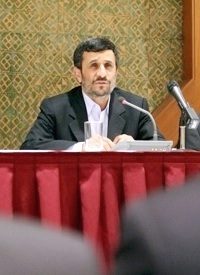
The Voice of America reported on May 5 that Iranian President Mahmoud Ahmadinejad has agreed "in principle” to accept Brazilian mediation in a United Nations-backed nuclear fuel swap deal. The UN deal calls for Iran to send its uranium to Russia for enrichment.
The enriched uranium would then be sent to France, converted into fuel rods, and sent back to Iran to power a nuclear reactor. ??The Iranian president’s office issued a statement reported by the semi-official Fars news agency revealing that Ahmadinejad spoke about Brazil’s offer of mediation during a conversation with Venezuelan President Hugo Chavez on May 4. "In a telephone conversation with his Venezuelan counterpart, Ahmadinejad agreed in principle to Brazil’s mediation over the nuclear fuel deal," Fars reported.
AFP reported that Brazil and Turkey, two temporary members of the 15-strong UN Security Council, have consistently defended Iran’s nuclear fuel program, which the West suspects is cover for a nuclear weapons drive.
Iran has recently begun enriching uranium fuel to a 20-percent level of U-235 required for a reactor in Tehran that is used to make medical isotopes. Though the United States and its allies have accused Iran of secretly trying to develop nuclear weapons, weapons-grade uranium is usually enriched to about 90 percent U-235.
A Reuters news report of May 5 said that the United States is lobbying UN Security Council members to back a fourth round of international sanctions on Iran in the coming weeks and to press it into curbing uranium enrichment.
Reuters also cited a speech made by Secretary of State Hillary Clinton to the 2010 Review Conference of the Parties to the Treaty on the Non-Proliferation of Nuclear Weapons (NPT) at the United Nations on May 3, in which Clinton charged that Iran’s nuclear ambitions put the world at risk and called on nations to rally around U.S. efforts to finally hold the Islamic Republic to account.
During the weekend prior to the opening of the UN conference, AP reported, Clinton suggested that Ahmadinejad was coming to New York "to divert attention and confuse the issue,” and promised: "We’re not going to permit Iran to try to change the story from their failure to comply [with the NPT].”
Ahmadinejad told the Middle East-based Al Jazeera news network on May 4 that he and President Obama would have to refrain from "acting too hastily" if the two sides are to reach agreement on the stalled plans regarding Iran’s nuclear enrichment program. "For example, the resolution presented to the IAEA [International Atomic Energy Agency] against Iran in the presence of Mr. Obama was a very negative, hasty action that had very negative repercussions in Iran," he said.
Ahmadinejad referred to to a November 2009 resolution adopted by the the IAEA that criticized Iran for defying a UN Security Council ban on nuclear enrichment.
The continuing threat of sanctions exerted on Iran from Western powers through the UN is undoubtedly viewed by Iranians as a violation of their national sovereignty, but it is more than that. By being a party to the Nuclear Nonproliferation treaty (NPT), the United States has surrendered part of its own sovereignty, as well.
Furthermore, U.S. interference into the internal affairs of other nations has dragged us into two undeclared wars in the Middle East, both being fought under the authority of the UN, not by a congressional declaration of war, as our Constitution requires. Again, this represents more ceding of sovereignty to the UN.
Will Iran become the location of Middle Eastern war number three? Some knowledgeable officials, including Texas congressman Ron Paul, think so. In a speech before the House of Representatives on April 22, Rep. Paul (R-Texas) voiced opposition to H.R. 2194, the Comprehensive Iran Sanctions, Accountability and Divestment Act, saying that “this entire push for war on Iran … is disguised.”
For our report and commentary on Rep. Paul’s speech, please read: “Rep. Ron Paul Opposes Iran Sanctions.”
Photo: Iranian President Mahmoud Ahmadinejad at UN NPT conference: AP Images



